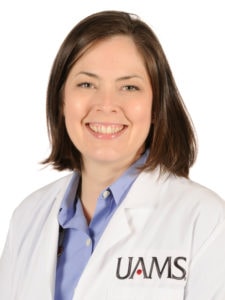 Dr. Gina Drobena will speak about the culinary medicine program and lifestyle medicine at the February 3 meeting of the Little Rock Plant Strong Club. Get more details on the Plant Club website.
Dr. Gina Drobena will speak about the culinary medicine program and lifestyle medicine at the February 3 meeting of the Little Rock Plant Strong Club. Get more details on the Plant Club website.
Program Featured on ArkLaTex Homepage
Culinary Medicine Learn on Demand Opportunity
 Culinary Medicine: An Ideal Interprofessional Opportunity
Culinary Medicine: An Ideal Interprofessional Opportunity
Presenter: Gina Drobena, M.D.
CME Credit is available! Click the link below for more information:
https://learnondemand.org/lms/activity?@activity.id=6769399
Culinary Class Offered to Patients During Infertility Awareness Week
By Katrina Dupins
May. 10, 2019 | A group of women gathered inside a commercial kitchen in Little Rock recently for a UAMS-led culinary medicine cooking class.
Culinary medicine is the practice of helping patients use nutrition and good cooking habits to restore and maintain health. UAMS is developing a culinary medicine program for health profession students, but this is the first time a class like this has been offered to the community.
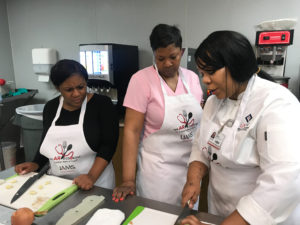
Taria Lightner, who works in UAMS nutritional services, served as the chef for the evening. She is a student at the University of Arkansas – Pulaski Technical College Culinary Arts and Hospitality Management Institute.
Laura Norman, a registered dietitian, also offered her expertise. Norman works with patients in the UAMS Fertility and Reproductive Endocrinology Clinic on Mondays and Tuesdays. She organized meal planning for the class and led nutrition discussions.
Lightner started class with the basics: emphasizing the importance of clean hands and sanitized surfaces. Then she showed the students proper techniques for chopping onions and mincing garlic.
Gloria Richard-Davis, M.D. organized the class as an outreach aimed toward patients with polycystic ovarian syndrome (PCOS), a hormonal disorder that affects one in 10 women of reproductive age. It is a common and treatable cause of infertility. Richard-Davis is board certified in reproductive endocrinology and infertility. She has been working as director of the culinary medicine program.
Women with PCOS often have higher than normal insulin levels, Richard- Davis said. A diet high in refined carbohydrates can make insulin resistance more difficult to control.
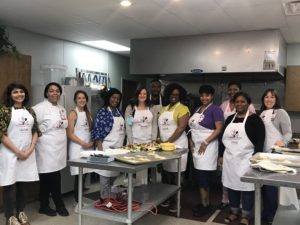
A recent study showed that the DASH (Dietary Approaches to Stop Hypertension) is beneficial to patients with PCOS. The DASH diet is very similar to the Mediterranean diet, but adapted to American taste.
After the eight students practiced chopping and mincing, they separated into three groups. Each group would make one item on the menu. They prepared white fish with a chimichurri sauce, brown rice pilaf and a roasted vegetable medley.
UAMS has adopted the culinary medicine curriculum created by Timothy Harlan, M.D., executive director of the Goldring Center for Culinary Medicine at Tulane University. The Goldring Center, which opened in 2013, is the first culinary medicine center in a U.S. medical school. Since then, several schools across the country have adopted Tulane’s curriculum.
“They licensed their courseware to about 52 academic institutions,” Richard Davis said, “There was a collaborative effort among those academic institutions to do research to understand how to better teach patients the appreciation for food as medicine, or as the curriculum says ‘health meets food.’”
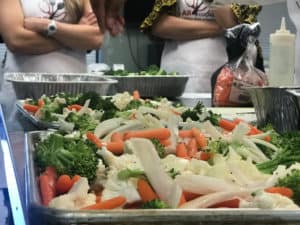
“Good nutrition is important to overall health,” Kaylee Lutrell, APRN, told the class. “When it comes to infertility a healthy diet is an important factor.”
Lutrell works in the fertility and endocrinology clinic with Richard-Davis. The class was one way the clinic commemorated Infertility Awareness Week.
“While a healthy diet won’t solve all infertility, it is certainly an added benefit we want all our patients to practice,” she said.
The amount of rainbow colors on a plate is another good indicator your food is nutritious, Lighten told the class.
Once the fish and vegetables were in the oven, and the rice was simmering on the stove, the women cleaned their prep areas and discussed how they could use their newly acquired knowledge.
Angel Smith of Little Rock, one of the students, lives with PCOS and is a patient of Richard-Davis. Smith has been on a weight loss journey and has changed her eating habits to include more fish and seafood.
“When I found out about this class, I thought it could give me more insight on meal ideas,” she said. “The food turned out wonderfully and has a good flavor.”
Cooking for a Healthier State
March 21, 2019 | “You are what you eat.”
“An apple a day keeps the doctor away.”
Most of us have heard phrases like these over the years. And many of us have taken them to heart because they sound like common sense. But we probably never thought much about the science that actually supports them.
Now, thanks to UAMS, when you go to the doctor, the prescription he or she gives you may include a grocery list.
That’s because the next generation of health care providers who study at UAMS, the state’s only health sciences university, will soon be taking courses in culinary medicine. The intent is to teach students, including those at the UAMS Northwest Regional Campus in Fayetteville, how to use food as medicine.
Why is UAMS adding culinary medicine to its curriculum? For starters, Arkansas ranks in the top 10 in the U.S. in three categories: obesity, diabetes and heart disease. Most of these conditions are preventable, and researchers, clinicians and educators across the country believe they can be addressed through culinary medicine.
“The opportunity to establish a comprehensive culinary medicine program at UAMS is something we believe will benefit our students, our patients and the state we serve,” said Stephanie Gardner, Pharm.D., Ed.D., UAMS senior vice chancellor for academic affairs and provost.
Since last summer, Gardner has been leading an internal group to explore how UAMS can integrate culinary medicine into its curriculum. In July, UAMS held its first meeting to gauge interest.
“We discovered there were many people who were already working in this area – where nutrition education overlaps with the cooking arts, healthy living and good food,” she said.

Culinary medicine works in conjunction with health coaching, nutrition counseling, exercise, medications, and other elements as part of an overall approach to improve a patient’s health and lifestyle, according to Timothy Harlan, M.D., executive director of the Goldring Center for Culinary Medicine at Tulane University.
UAMS decided to adopt the culinary medicine curriculum created by Timothy Harlan, M.D., executive director of the Goldring Center for Culinary Medicine at Tulane University. The Goldring Center, which opened in 2013, is the first culinary medicine center in a U.S. medical school.
“We are fortunate to be paring up with the Goldring Center, which has really been the leader and founder of culinary medicine,” said UAMS Chancellor Cam Patterson, M.D., M.B.A. “This has turned into a statewide tidal wave with a lot of enthusiasm.”
Since that initial meeting, volunteers from across UAMS have been meeting to discuss how culinary medicine could be integrated into the College of Medicine and interprofessional education (IPE) curriculum, community engagement, continuing education, and scholarship and research.
“We believe we are cooking for a healthier Arkansas,” said Gloria Richard-Davis, M.D., program director. “There’s a benefit not only for our patients, but also for our students. They’ll learn to take better care of themselves, and I think they’ll have a great time doing it.”
In October, UAMS showcased its plans for the new curriculum, and the UAMS campuses in Little Rock and Fayetteville participated in activities related to culinary medicine.
- A group of medical students in Little Rock went to the teaching kitchen of the Culinary Arts Institute at UA Pulaski Tech, where the students prepared a meal for the chancellor.
- The IPE group in Little Rock hosted a student cooking challenge as part of a case study involving federal SNAP benefits.
- UAMS Northwest Regional Campus students and faculty from multiple departments (medicine, pharmacy and physical therapy) attended a culinary medicine workshop at Brightwater: A Center for the Study of Food in Bentonville.
According to Angel Holland, D.P.T., Ed.D., director of clinical education and associate director of the IPE program at the Northwest Campus, UAMS is seeking to integrate culinary medicine into all its health profession curricula. That way, doctors, nurses, pharmacists, physical therapists and more will be better equipped to help their patients make healthy lifestyle choices.
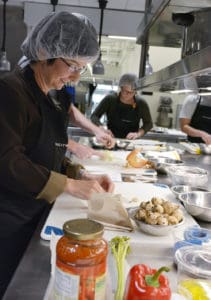
The Mediterranean Diet, inspired by the eating habits of those living in the European countries on the Mediterranean sea where the populations have lower rates of the above chronic conditions, is an important part of the treatment plan that Timothy Harlan, M.D., executive director of the Goldring Center for Culinary Medicine at Tulane University, prescribes for his patients.
Pearl McElfish, Ph.D., vice chancellor for the Northwest Campus, pointed out how culinary medicine complements the food systems work UAMS is doing in Northwest Arkansas and across the state. Over the last four years, its research division has received more than $10 million in grants for investment in community health, including healthy food systems.
“UAMS has a robust history of policies, systems and programs to help improve food systems,” McElfish said. “The next step is training all our students how to talk to their patients about making healthy food choices.”
To continue the momentum, the Northwest Campus is inviting some local health care providers and leaders to an event at Brightwater later this year. The event will give them a chance to experience culinary medicine and explore a new way to bring health and wellness to our community.
So the next time you visit your doctor, don’t be surprised if he or she asks you what you had for lunch.
This article first appeared in the March issue of Celebrate Arkansas and has been reprinted with permission.
Culinary Medicine Receives $100,000 Chancellor’s Circle Grant
UAMS Chancellor Cam Patterson, M.D., MBA, awarded 12 program grants totaling a record-tying $425,000 at the annual Chancellor’s Circle Grant Awards ceremony and reception held March 5.
The funds awarded match the record set last year by the Chancellor’s Circle, which provides funds to support key mission areas in health care education, research and patient care.
One of the grants was for the Culinary Medicine Curriculum and Food Pantry, to adapt a culinary medicine curriculum for UAMS students and to develop an in-house food pantry for employees and students who struggle with food insecurity. Gloria Richard-Davis, M.D., professor in the Department of Obstetrics and Gynecology, and Tanya Johnson, director of Nutrition and Food Services, accepted the $100,000 grant, tying the record for largest grant to date.
Demonstrating a Healthy Recipe on KATV
Dr. Cam Patterson and Medical Student Sasha Ray from the University of Arkansas for Medical Sciences demonstrate how to make a vegetarian pizza for What’s for Dinner.
UAMS is beginning a new culinary medicine curriculum, and Dr. Patterson explains how this will benefit medical students, doctors, and patients in the long run.
(The story is no longer on the KATV site)
Doctors Cooking Up a Healthier Arkansas with UAMS Curriculum
 We go to our doctors for everything health, now future doctors who go through UAMS will also be able to offer their patients “Culinary Medicine”.
We go to our doctors for everything health, now future doctors who go through UAMS will also be able to offer their patients “Culinary Medicine”.
Currently, Arkansas ranks in the top 10 in the US in three categories obesity, diabetes, and heart disease.
UAMS recently cooked up the pilot program it looks to implement in the medical curriculum this spring.
This 4th-year elective program aims to educate doctors on how to target cooking for different conditions to better advise their patients.

